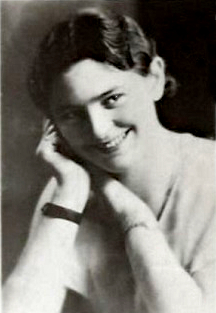Marguerite Bervoets
Marguerite Bervoets | |
|---|---|
 | |
| Born | 6 March 1914 La Louvière, Belgium |
| Died | 7 August 1944 (aged 30) |
| Nationality | Belgian |
| Occupation | Resistance Fighter |
| Years active | 1942 – 1944 |
| Signature | |
 | |
Marguerite Bervoets, born in La Louvière, (6 March 1914 – 7 August 1944)[1] was a Belgian resistance fighter during World War II and killed in a prison in Germany.
Biography
[edit]Marguerite was a graduate in philosophy and literature, and a poet. At the time of the German invasion of Belgium she was working as a teacher in Tournai.[2] After the fall of Belgium to Nazi Germany, Marguerite published in the press, "La Deliverance".[clarification needed] It was a resistance movement for resistance members to rise during the occupation and would transfer intelligence to the Allied Powers.[clarification needed][3]
On 8 August 1942 Bervoets and another resistance member, Cécile Detournay, went to the edge of Chièvres Airfield for the purpose of photographing newly installed anti-aircraft guns. They were both carrying a shopping bag and a camera, once they reached the edge of the airfield they began to take pictures. A few minutes later a German sentry caught them by surprise and escorted them both to an officer nearby. They both showed their shopping bags and claimed that they were going to a nearby farm to get some food and take pictures of the fields. Unfortunately the German lieutenant ordered an investigation. A woman, a prosecution witness, provided evidence that led to the indictment of Bervoets and the leaders of the group to which she belonged.[3] At Bervoets's house they discovered weapons. She sensed her fate, and in high school she would often quote Maeterlinck, saying; "It is beautiful to when one sacrifices oneself, that sacrifice brings happiness to other men".

After a few months of incarceration in Mons, Bervoets and Detournay were deported to Germany for their fates to be decided by the Volksgericht (People's Court) of Leer. Her trial was held on the same day as that of resistance fighter Fernande Volral. Both women were sentenced to death, and Detournay to 8 years of forced labour.[3]
Her Farewell Letter
[edit]Bervoets's farewell letter (often called 'moral will') was a letter written on 13 November 1941 to her friend Mme Balasse de Guide; collected in Pierre Seghers' Anthologie de la Résistance:
My friend,
You are the one among all whom I have chosen to receive my last wishes. I know that you love me enough to make them be respected by everyone. You will be told that I died needlessly, foolishly, like a fanatic. It will be the truth … factually, as far as it goes. There will be another truth. I perished to witness to the fact that one can at the same time love life and acquiesce to a necessary death.
Yours will be the task of softening my mother's pain. Tell her that I have fallen so that the skies of Belgium may be purer, so that those who follow me may live as freely as I myself have so much desired, that despite everything I have no regrets. As I write you, I calmly await the orders that will be given to me. What will they be? I don't know, and that is why I write you the farewell that my death must deliver you. It is to those like you that it is entirely dedicated, those who will be enabled to be reborn and to rebuild. And I think of your children who will be free tomorrow. Farewell.
Death
[edit]Marguerite Bervoets and Fernande Volral were executed by "fallbeil" (German guillotine) on 7 August 1944 in Wolfenbüttel, Germany. Her body is buried in Mons Communal Cemetery.[4] Detournay was liberated by US forces on 24 April 1945.[5]
Recognition
[edit]- In honor of Marguerite Bervoets, the Lycée de Mons, where she had her last three years of humanities and where her mother was director, bears her name; today it is the Athénée Royal Marguerite Bervoets.
- On 17 November 1946, an inauguration in the courtyard of the École Moyenne de la rue de Bouvy in La Louvière, a monument dedicated to Marguerite Bervoets and Laurette Demaret, former students of this establishment.[6]
- A street of Mons also bears her name, as well as a street of Forest, (in Brussels) and even a street of Guyancourt (near Paris).
- There are many monuments that pay tribute to her, both in Belgium (especially in La Louvière thanks to a monument and a commemorative plaque), and abroad (for example on the shores of Lake Como ).
- The 151st promotion of Social and Military Sciences at the Royal Military Academy was sponsored by Marguerite Bervoets.
- At the school she taught at, a plaque in tribute to Marguerite Bervoets is installed in the entrance.
- A street in Forest bears her name
Bibliography
[edit]- Marguerite Bervoets, A Heroine, 1914–1944, L. Balasse-De Guide, The Renaissance of the Book, Brussels, 1958
- Marguerite Bervoets, E. Pequet, coll. The Notebooks of the Memory, HCD, 2014.
References
[edit]- ^ "Monographie de la Louvière - ville de la Louvière". Archived from the original on 2010-01-15. Retrieved 2019-11-03.
- ^ "Forest la plaque commémorative en l'honneur de la résistante a été inaugurée ce lundi matin : Forest rend hommage à Marguerite Bervoets".
- ^ a b c Suzanne van Rokeghem, Jacqueline Aubenas, Jeanne Vercheval-Vervoort, Des femmes dans l'histoire en Belgique, depuis 1830, Luc Pire éditions, 2006, 303 p.
- ^ https://www.findagrave.com/memorial/223937420/marguerite-bervoets
- ^ Commission de l'historique de la résistance, Livre d'or de la résistance, éditions Leclercq, Bruxelles, 1949
- ^ "Pages perso Orange – Créez facilement votre site web personnel". pages.perso.orange.fr.
